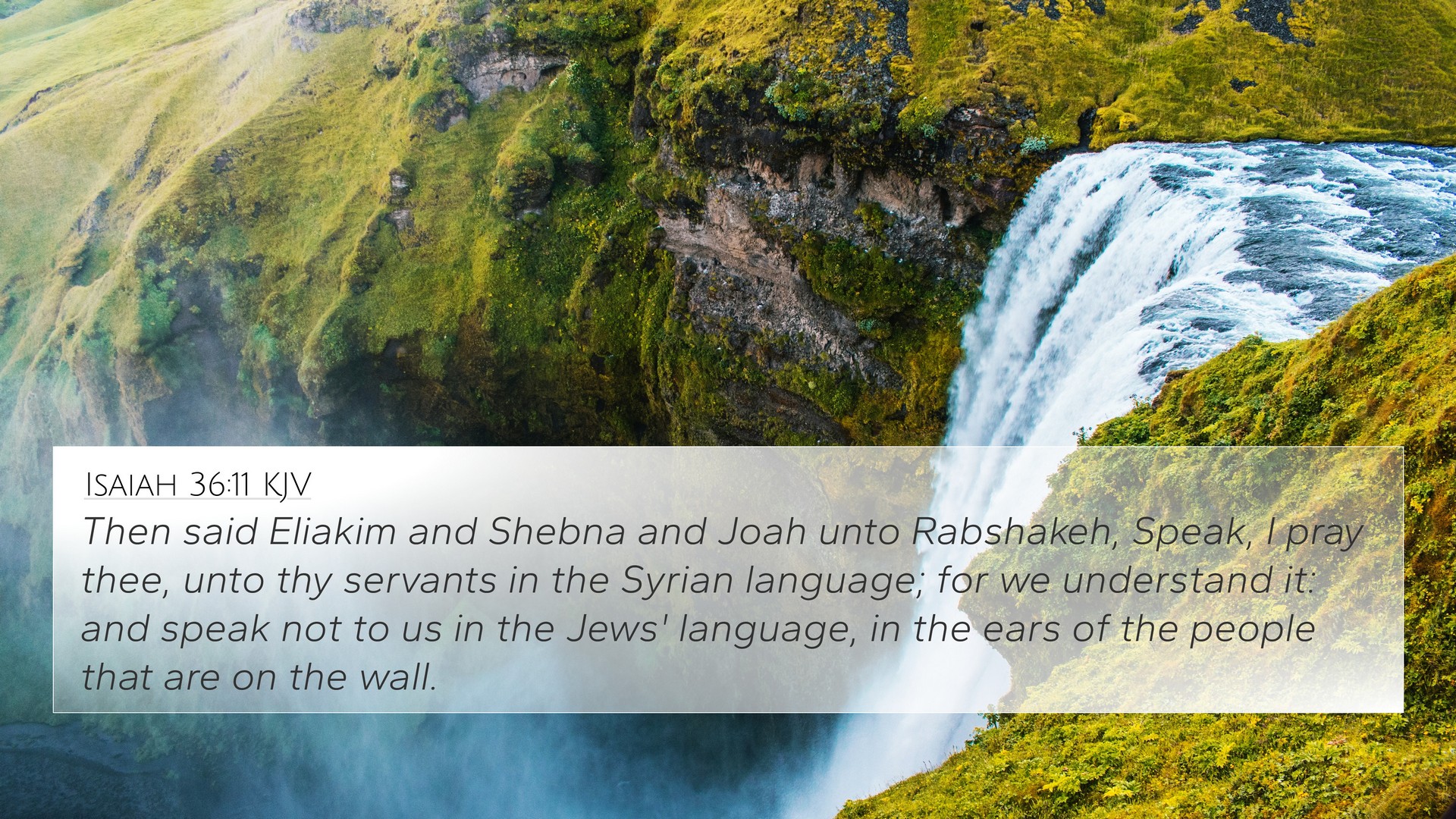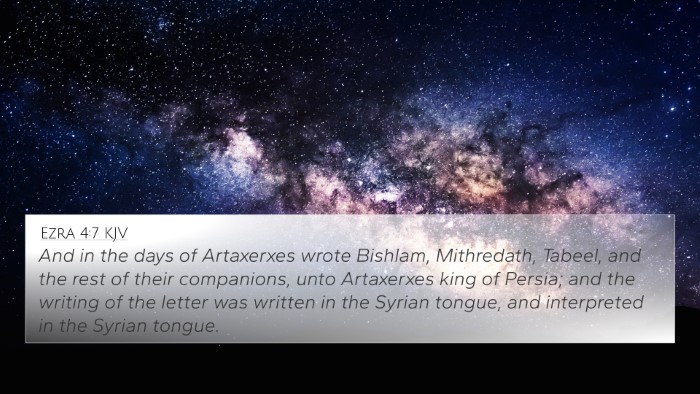Understanding Isaiah 36:11
The verse Isaiah 36:11 holds significant meaning within its context, as well as in the broader narrative of Scripture. This verse is set amidst a crucial episode in the history of Israel, where the Assyrian envoy speaks to the inhabitants of Jerusalem, challenging their faith and trust in God.
Verse Text
“Then said Eliakim and Shebna and Joah unto Rabshakeh, Speak, I pray thee, unto thy servants in the Syrian language; for we understand it: and talk not with us in the Jews’ language in the ears of the people that are on the wall.” (Isaiah 36:11)
Contextual Background
This verse occurs during the siege of Jerusalem by the Assyrian army, led by Rabshakeh. The leaders of the Jews—Eliakim, Shebna, and Joah—ask the Assyrian representative to speak in Aramaic rather than Hebrew to prevent public panic and preserve morale among the people.
Commentary Insights
- Matthew Henry: Henry emphasizes the anxiety of the people during this siege. The plea to speak in Aramaic reflects their desire to keep the discussions from instilling fear in the citizens. The leaders show their attempt to maintain control over a dire situation.
- Albert Barnes: Barnes notes that the Assyrian’s response to the request illustrates a common tactic in warfare: psychological manipulation. By refusing to listen to Eliakim’s plea, Rabshakeh aims to sow seeds of doubt in the hearts of the people, demonstrating the importance of communication in times of crisis.
- Adam Clarke: Clarke provides insights into the languages used, highlighting the significance of Aramaic as the diplomatic language at the time. He explains that the leaders’ request reflects their tactical awareness, demonstrating wisdom and prudence.
Thematic Connections
Isaiah 36:11 invites readers to consider broader themes in the Bible, such as the power of words, the struggle for faith in adversity, and the importance of communication within crisis situations. Below are some thematic connections and cross-references that may enrich the study of this verse:
- Proverbs 18:21: “Death and life are in the power of the tongue: and they that love it shall eat the fruit thereof.” This verse emphasizes the influence words have on life and death, relevant to the fear instilled by Rabshakeh's rhetoric.
- 2 Kings 18:26: A parallel account of the same events, providing context on the Assyrian siege and the responses from the leaders of Judah.
- Psalms 46:1-3: An expression of faith in God's protection and help in times of trouble, contrasting the fear the people feel from the Assyrian threat.
- Isaiah 30:10: “[The people] say to the seers, See not; and to the prophets, Prophesy not unto us right things, speak unto us smooth things...” This passage captures the challenge of listening to God’s message amidst opposition, akin to the self-imposed deafness seen in the leaders at this moment.
- Matthew 10:16: “Behold, I send you forth as sheep in the midst of wolves: be ye therefore wise as serpents, and harmless as doves.” This speaks to the wisdom needed in conflict, comparable to Eliakim's request for subtlety in communication.
- Colossians 4:6: “Let your speech be always with grace, seasoned with salt, that ye may know how ye ought to answer every man.” The way we communicate can reflect our faith, which echoes the leaders’ concerns in Isaiah.
- Isaiah 26:3: “Thou wilt keep him in perfect peace, whose mind is stayed on thee.” This verse promises peace in trusting God, contrasting the fear invoked by Rabshakeh’s taunts.
Comparative Bible Verse Analysis
Understanding Isaiah 36:11 also involves comparative analysis with verses that discuss the themes of fear, speech, and God's protection:
- John 14:27: “Peace I leave with you, my peace I give unto you: not as the world giveth, give I unto you. Let not your heart be troubled, neither let it be afraid.” This offering of divine peace serves as an antidote to the fear expressed by the people of Jerusalem.
- Hebrews 13:6: “So that we may boldly say, The Lord is my helper, and I will not fear what man shall do unto me.” It reinforces the essence of finding strength in faith rather than succumbing to fear from adversaries.
Cross-Referencing Biblical Texts
The process of cross-referencing biblical texts allows for a deeper understanding of Isaiah 36:11 through the elucidation of various scriptural parallels. Within this verse’s context, several connections can be further explored:
- Daniel 3:16-18: The response of Shadrach, Meshach, and Abednego illustrates a similar theme of standing firm in faith even when challenged by authority.
- 1 Peter 3:14: “But even if you should suffer for righteousness’ sake, you will be blessed.” This connects the theme of righteousness in the face of fear, mirroring the plight of Jerusalem's leaders.
- Joshua 1:9: “Have I not commanded you? Be strong and courageous. Do not be frightened, and do not be dismayed, for the LORD your God is with you wherever you go.” This passage emphasizes reliance on God in times of fear, resonating with the leaders’ concerns.
Conclusion
Isaiah 36:11 serves as a profound reminder of the importance of communication during crises and highlights the struggles of faith amid fear and uncertainty. By exploring cross-references and thematic connections, believers can deepen their understanding and application of this verse in their lives. Whether through personal study or collective reflection during Bible study groups, the insights gleaned from Isaiah 36:11 can help cultivate a greater reliance on God’s strength and wisdom.
Additional Resources for Bible Study
To support your journey in understanding and applying cross-referenced themes in Scripture, the following resources are recommended:
- Bible Concordance: A tool that can help find specific verses and their connections.
- Bible Cross-Reference Guide: A comprehensive guide for tracing biblical themes and linkages.
- Cross-Reference Bible Study Methods: Various approaches to utilizing cross-references for deeper scriptural insights.





